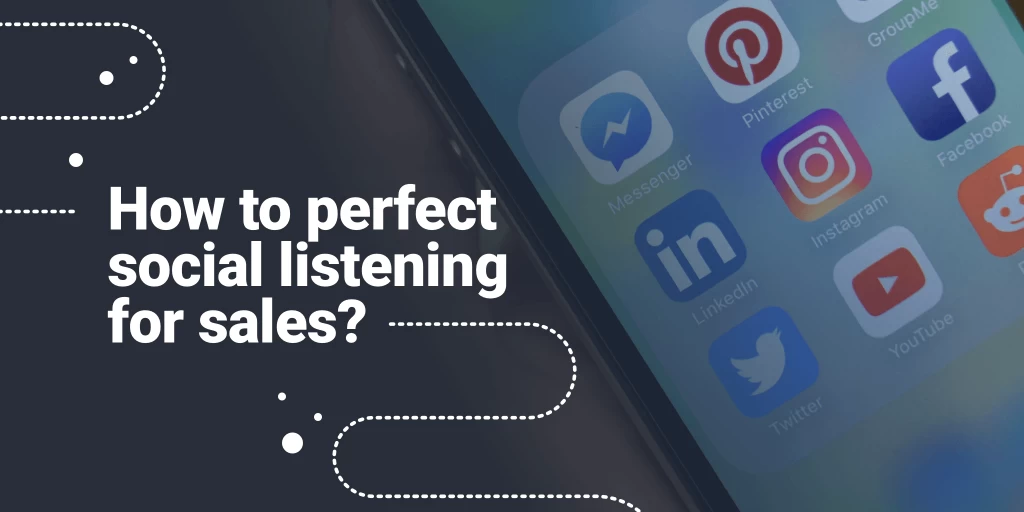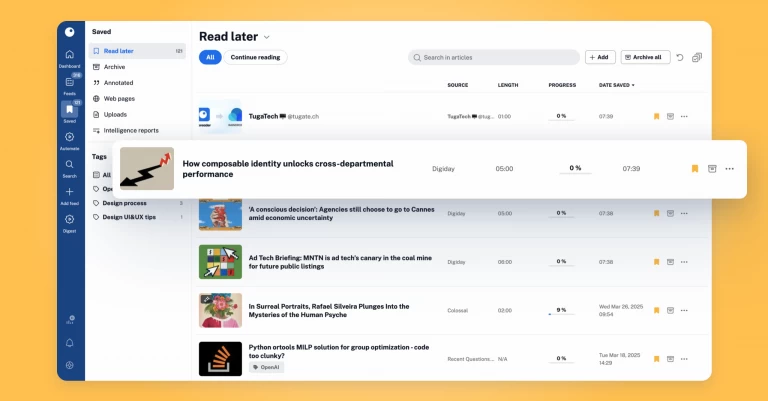How To Perfect Social Listening For Sales?

Social media, for all its ubiquity and permeation into daily life, still remains under-explored within marketing and as a result underused by brands to boost sales numbers. Companies struggle to keep up with customer inquiries and requests and have a spotty record in tone and deliver at best. Most maintain a social media presence out of obligation, and that’s a shame, because social media data is one of the most valuable resources at your fingertips. Even better – it’s data you don’t even have to pay to acquire.
Social media listening distills the most vital lessons, insights and trends, and harnesses them to not only improve your public image, but strike gold.
What is social listening?
The question may be perplexing to some. After all, social media should be self-explanatory and in the end, don’t you have a presence on Facebook and Twitter (that’s the starting point) for precisely this purpose. Have an outlet for customers to reach out and be heard. Yes, but also no. The act of social media listening extends the simple process of logging into your profile and scrolling through mentions, tags and direct messages. What you’re thinking of is social media monitoring and there is a marked difference between the two.
Social monitoring extends only to gauging customer interaction on social media. Are there a lot of comments and shares on a Facebook post? How many people are mentioning you on Twitter and how many are engaging with your tweets? Are there any new reviews on Google and Yelp? That’s all there is to social monitoring.
Whereas with social listening, what I’ve outlined above is the starting point. Data drives business and social media data is waiting to be harnessed to boost your brand’s profile and generate direct sales. Social media listening dares to ask the big questions, which managers and owners alike are hesitant to ask. What do people really think of your brand? If they don’t connect with messaging and marketing efforts, why is that?
Social listening requires you consolidate social media data from your own channels as well as the platforms your customers frequent where you don’t have a presence. It’s crucial to have an ear out anywhere someone may be talking about you. Complement these data sets with data on your direct competitors, whether they’re market leaders or coming for your market share.
Why does social listening matter?
Numbers speak volumes and more importantly what customers say in their social interactions with your brand reveals inherent strategic changes needed to strengthen your impact in your market as a whole. With the right social media listening tool and filters, you’re well on your way to steer the ship in the right direction and grow your customer base in a meaningful, sustainable manner.
Social listening reveals an unbiased analysis of your brand’s health online void of feelings you’re right to have as part of the management team (or as the owner when we’re talking about smaller businesses). You should aim to answer the following questions about your company and products:
- Is the customer sentiment towards the brand positive or negative?
- If the brand is perceived in a negative light, what are the main criticisms you identify?
- What appeals most about your products to your customer base?
- Has your latest campaign been successful and what contributed to its performance?
The answers illuminate your actual standing with your target customers and establish your starting point in improving your brand health and customer relationships. Insights from social media data are a powerful tool to have in your sales efforts.
How to use social listening for sales?
Sales is only one of the applications of social listening.
How you listen and what you listen to determine what results you’re going to see at the end. Are you listening for a short period or plan to incorporate it indefinitely? What is the tool(s) you buy for the purpose? Does geographic location matter to you? Talkwalker, Sprout Social, Hootsuite, Adview – each has its own specific strengths to consider and choosing the right tool requires time and thought.
The same applies to the keywords most important to you. Industry standards such as product name and brand name are obvious, but then we move into specifics. Go through solid interrogation of the competitors worth social listening as the most valuable resource.
Is your CEO or brand owner highly recognized in the mainstream? Jeff Bezos (Amazon) and Elon Musk (Tesla) fit this bill and what publicity they generate affects their brands. Perhaps you employ people who are well regarded in their field of expertise and monitoring social media response to them is as important as focusing on your products.
Find your leads and grow your target audience
Let’s clear this first, because whenever we think about sales the first thought heads immediately to generating new sales leads. Businesses prioritize expansion whenever possible and luckily, social listening presents you with not one proactive strategy for lead generation:
Customer poaching: Any marketer worth their salt already monitors the competition closely. The reasons often have to do with studying their successes, but rather than simply copy what they do, listen to their customer complaints. Not every brand reacts quick enough to their customers, which is a tactical mistake. We’ve grown more impatient as a society and every second a customer waits widens the opening for you to descend from the heavens above as a savior. No time or effort goes into this type of sales conversion.
Active listening: Listen beyond your brand and product names to catch when a prospect customer makes inquiries about a new purchase. Twitter and Facebook groups are rife with such examples, so keep your ear to the ground and step in to offer a solution. Timing matters here as this sends a strong message, ‘I’ll be here for you, whenever you need me.’
Strategic listening: Short-term goals regarding sales numbers are good, but a long-term strategy to position your brand in new markets and market niches yield much bigger rewards. Social listening analyses industry data on social media as well and notes shifts in market trends. Shifts produce a new need and a completely fresh niche. With a flexible marketing strategy and the right resources, your brand readily faces change and adapts well to meet different customer demands. This works especially well, if you’re trying to develop a product.
Communicate with your customers and listen to them
Ask any company owner or upper manager whether they know their customers, and you will hear a confident affirmative. Isn’t that why so much money has gone into customer research, targeting the product and honing in on the marketing strategy? Yet, it’s one thing to see your target customer on paper and another thing entirely to encounter them in their natural habitat (on the Internet). A different beast still in trying to create value for customers.
Social media listening studies your customers and identifies their values, their habits and tastes. The more you listen to their conversations with (and about) you, the more insights you gain about:
- Are there any subsets of customers that use your products you haven’t taken into consideration?
- What are the aspects about your product or service that pull in sales?
- What else do they need from your product or service?
- What are the issues that they have with your product or service?
- Are customers comparing you to your competitors and in what way?
Listening, of course, is a precursor to better communication. Customers value a brand capable of responding to queries on time and speaking to (as opposed to at) them. One of the additional pros effective communication lies in how you form partnerships with the customers most vocal about your products. Brand ambassadors offer free publicity and in the age of influencers, that’s powerful sales potential. Provided you select the right ambassadors.
Offer support through the process
You have heard it a thousand times. Allow us to repeat it one more time – customer service makes or breaks trust in your company and your products. Where there’s a discrepancy between what’s advertised (often with platitudes) and what customers have to deal with, the customer prefers to take their business elsewhere. Social listening pays specific attention to disgruntled customers (be it aimed directly at your brand’s accounts or posted without tagging you).
Efforts placed in handling complaints in a timely manner have a three-hold effect that benefits your brand in the long run:
- Exceptional customer service becomes a feature of the product / service, and you gain a trustworthy reputation. Coupled with properly targeted messaging, it keeps you in everyone’s good graces.
- Happy customers are loyal customers are repeat customers. The occasional problem or negative experience is an inevitable part of running any business, but handle it with care and you’ve earned your customers’ trust and respect.
- Loyal customers don’t hesitate in making recommendations to their family, friends and coworkers. While not the quickest way to generate sales, it’s an organic growth at no further expense. There’s little way to making a purchase, because the testimonial does most of the heavy lifting.
Gain insights and run better future campaigns
Campaign analysis ranks as one of the most useful applications of social listening as brands tend to sink in sizable budgets and resources to run one. A lot rides on the success of a campaign and whether you go for an online-only campaign or choose to also invest in traditional marketing, you’ll hear about it – the good and the bad – online. Sales leads and conversions are only a base gage for success. At best you can identify the moment you connected with your target customer base by the volume in new sales. Useful, yes. Not particularly informative as to why a campaign yields specific results.
Capturing the reactions to the campaign online digs deeper beyond the “pass / fail” dichotomy and arrives at the heart of the matter. Social media insights such as DMs, shares, comments, a trending hashtag on Twitter and a spike in mentions on social media platforms like review sites, Reddit and YouTube signal a strong engagement (regardless of whether it’s positive or negative). This data reveals common sentiments among customers and the public at large (again something to keep in mind as more than one brand has become viral over the past decade).
Note what part of your campaign messaging was tone deaf, what failed to engage a response and isolate what has connected. Future campaigns that reflect these changes report an increase in sales as well as social engagement.


